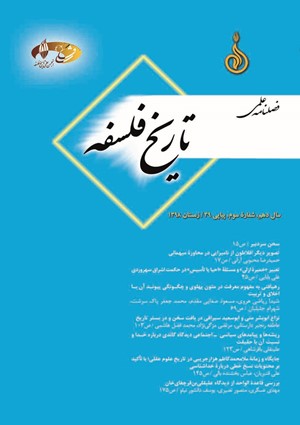جايگاه و زمانة ملامحمدکاظم هزارجریبی در تاريخ علوم عقلی؛ با تاکید بر محتویات نسخ خطی پیرامون خداشناسی
محورهای موضوعی : Geneology of philosophical schools and Ideasعلی قنبریان 1 , عباس بخشنده بالی 2
1 - دانشگاه تهران
2 - الهیات و معارف اسلامی
کلید واژه: ملامحمدکاظم هزارجریبی ایمان وجود خدا صفات خدا شبهات دینی,
چکیده مقاله :
یکی از اندیشمندان مذهبی شیعه که جایگاه علمیش کمتر مورد بررسی قرار گرفته، ملامحمدکاظم هزارجریبی استرآبادی (متوفای 1236 قمری) است. او از دانشمندان شیعی اواخر دورة زنديه و اوایل قاجار است كه در زمینههای گوناگون الهیات، بویژه اعتقادات، تلاشهای متعدد علمی انجام داده است. آثار هزارجريبي منتشر نشدهاند اما نسخههای خطی بسیاری به زبان فارسی و عربی از وي باقی مانده است. تألیفات، تصنیفات و ترجمههای هزارجریبی، در نشر و بسط فرهنگ شیعی و تعقلورزی تأثیر بسزایی داشته است. او در آثارش به این نکته توجه ميكرد که نوشتارش باید مورد استفادة عموم طالبان الهیات قرار بگیرد و بهمین دلیل، غالب آثارش به فارسی است. این نوشتار در گردآوری اطلاعات با استفاده از منابع کتابخانهيي بویژه تصحیح انتقادی نسخ خطی و در پردازش اطلاعات با روش توصیفی ـ تحلیلی، به پاسخ این پرسش میپردازد که مهمترين بحثهای هزارجریبی دربارة خداشناسی کدامند؟ بعنوان یافتههای تحقیق میتوان به این نکات اشاره نمود: او فطری بودن خداشناسی را میپذیرد ولی مخالف فطری بودن دین اسلام است. وی برای اثبات وجود خدا از دلايل متنوعی مانند برهان امکان و وجوب، برهان نظم و برهان فطرت استفاده کرده است. همچنين برای حل برخی شبهات در خداشناسی تلاش كرده تا معناشناسی درستي از برخی صفات الهی مانند اراده، عدالت و حکمت ارائه دهد.
One of the Shi‘ite thinkers whose scientific contributions have rarely been explored is Mullā Muḥammad Kaẓim Hezārjarībī Astarābādī (died in 1234 AH). He was one of the Shi‘ite scholars of the late Zand and early Qajar periods who conducted several scientific studies in different fields of theology, particularly on Islamic beliefs. Hezārjarībī’s works have never been published; however, a great number of his manuscripts in Persian and Arabic are available today. His writings and translations have played a significant role in the dissemination and expansion of the Shi‘ite culture and philosophy. When composing, he always paid attention to the point that his writings should be readable by all the people interested in the field of theology, and that is why most of his works are written in Persian. Following a descriptive-analytic method and relying on library resources, particularly, a number of critically corrected manuscripts, the authors of this paper aim to investigate the nature and content of Hezārjarībī’s most important discussions regarding theology. The findings of this study demonstrate that, in his view, theology is intrinsic while Islam is not. In order to prove the existence of God, he resorted to a variety of proofs such as possibility and necessity, order, and fiṭrah (human nature) arguments. Moreover, he tried to provide the correct meanings of some divine attributes such as will, justice, and wisdom to remove some theological ambiguities.
